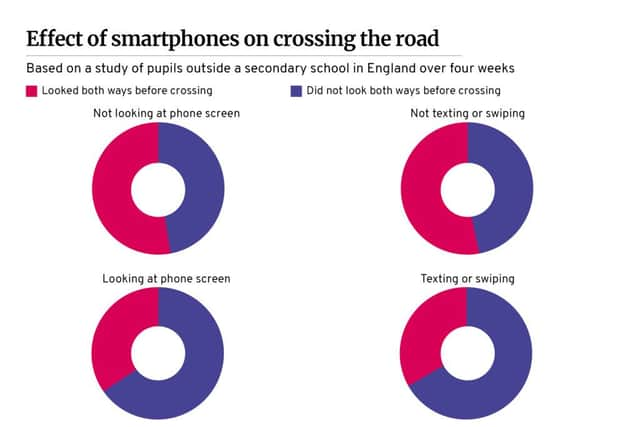First News: Alerting pupils to danger of crossing road while using mobile phones


Clear link with serious accidents involving schoolchildren on their mobiles


JPIMedia is backing First News in launching Look Up! campaign to warn schoolchildren about dangers of crossing roads while using phones.
Although many people are distracted by mobile phones, children are the most affected.
Advertisement
Hide AdAdvertisement
Hide AdBy the age of 12, nearly all children have a phone and there is a clear link between the use of mobile devices and the time of serious accidents involving children, particularly at the end of school days.
COVID-19 lockdown and school closures mean the
A class size of child pedestrians are killed or seriously injured on UK roads EVERY week
road safety figures for 2020 were affected that year. But, in 2019, 6,200 pedestrians were killed or suffered life-changing injuries on UK roads.
More than one in five of those people (1,415) were aged 17 or under – that’s around a whole class of schoolchildren EVERY week.
Advertisement
Hide AdAdvertisement
Hide AdAccident data shows those aged 11 to 14 are most likely to be killed or badly hurt – around 50 EVERY month.


Different studies over a number of years have shown phones are a growing cause of distraction for pedestrians, affecting if they cross a road safely.
Those distracted by phones are known as SMOMBIES (from smartphones plus zombies).
A University of Lincoln study published in 2019 looked at mobile phone use by schoolchildren while crossing the road, observing pupils outside a secondary school in the north of England over a four-week period.
Advertisement
Hide AdAdvertisement
Hide AdThey were watching to see if the pupils looked (or failed to look) left
Mobile devices are a growing cause of distraction for Smombies – Smart Phone Zombies
and right before crossing the road, whether they crossed when the pedestrian light was on red or green, and if they crossed on the crossing.
Researchers found that nearly a third (31.37 per cent) of road crossings were made by pupils with a phone or other device. And they looked less frequently when they had them.
Advertisement
Hide AdAdvertisement
Hide AdThey concluded the safety of school-age pedestrians is affected by mobile phones and music players.Studies in other countries such as Australia, Serbia and the US also found pedestrians who were talking or texting on a mobile phone looked for traffic less often than others.
Some countries and some states in the US have made it against the law to cross a road while using a phone.
Laboratory simulations also have shown child pedestrians walked slower when talking on a mobile phone, paid less attention to traffic, allowed less time to cross before a car coming towards them, and had more traffic hits and misses while using a mobile phone.
The 2019 official road safety numbers show children aged 11 and 12 were the most at risk of serious accidents while walking on UK streets.
Advertisement
Hide AdAdvertisement
Hide AdThe number of children killed or seriously injured more than doubled from 83 ten year-olds
Pedestrians aged 11 and 12 are most at risk
to 172 11 year-olds – the age most children begin to travel on their own to and from school for the first time.
This is also the age when most children have their own phone to stay in touch with family.
The First News campaign, supported by JPIMedia, is asking children to design Look Up! posters that will be sent to all primary and secondary schools nationwide as part of an Assembly Pack including classroom resources.
Advertisement
Hide AdAdvertisement
Hide AdAll schools will be asked to hold assemblies in summer and/or autumn terms, warning children of the dangers of mobile phone distraction while navigating roads.
First News gives every child access to trusted news and inspires them to change the world.
First News is the fun-to-read, multi-award-winning children’s newspaper delivered to your door and digitally across all devices every week.
First News gives children access to factual, impartial news and entertainment from the UK and around the world expertly written by award-winning journalists!
Advertisement
Hide AdAdvertisement
Hide AdFirst News promises to educate and entertain with every read.
A subscription to First News gives a child the knowledge to help them learn, debate and think critically about the world around them and their place within it.